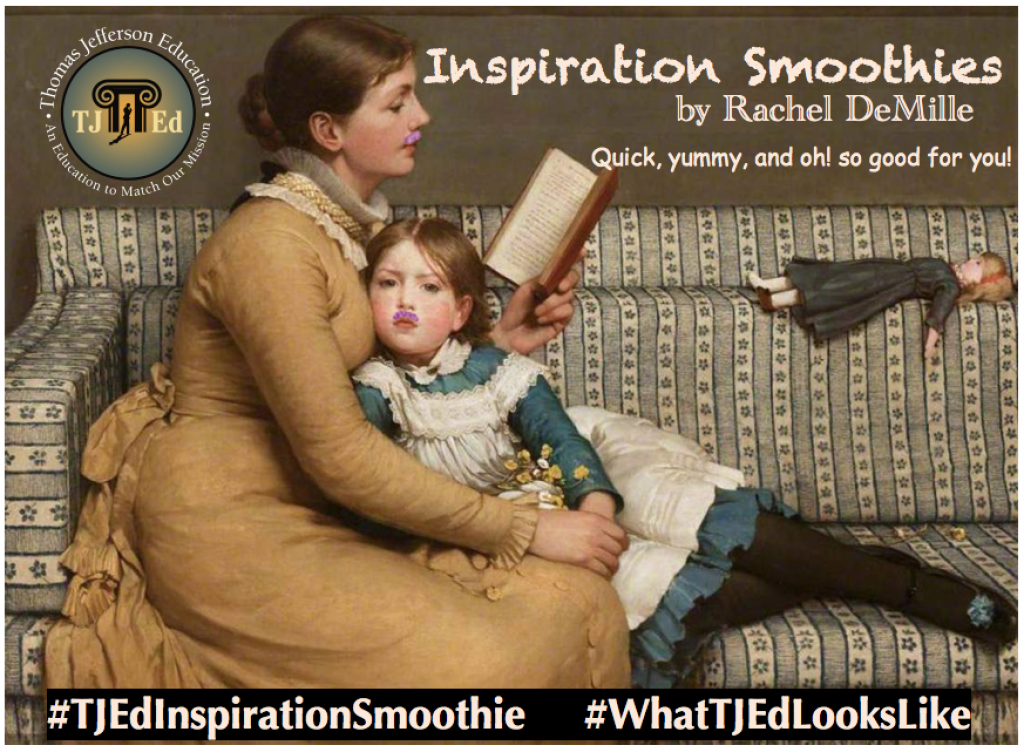
Welcome to the Journey
 Homeschooling is a big change for most people! It’s different from what we were raised in, and different from most of the people we know and are surrounded with.
Homeschooling is a big change for most people! It’s different from what we were raised in, and different from most of the people we know and are surrounded with.
Like with any lifestyle commitment – from weight loss, overcoming addiction, religious conversion, getting physically fit, etc. – homeschoolers do well to find support from others who are sharing the same transformational journey. They might find it helpful (especially at first) to minimize influence from those who might constantly challenge their values or compete with their choices.
We build tribes to help us stay focused on the things we’re trying to do to break old patterns and form new habits. It’s a good thing! That being said, not all things in our life are or need to be defined as “homeschool vs. not-homeschool”.
Tribes
 I mean, think about it: You have other important values, projects, etc., that include you in tribes that also support you. People who are conscientious about parenting. People who are devout about their faith. People who love horses/crafting/running/cooking with whole foods/etc.
I mean, think about it: You have other important values, projects, etc., that include you in tribes that also support you. People who are conscientious about parenting. People who are devout about their faith. People who love horses/crafting/running/cooking with whole foods/etc.
When speaking with someone new, consider first what tribal values you share, and resist the temptation to automatically define the potential relationship in terms of a tribe that they are not currently a part of.
I think learning diplomacy – the ability to build bridges of rapport and cooperation among good people of differing viewpoints – is invaluable. And my guess is, you’re more diplomatic and edifying about sharing your certain things you love and value than you realize – like maybe something as deep as your faith, or as simple as your love for a certain a cappela group. You’ve had longer to consider it, more practice at doing it, and more models on how to do it. You can get good at the homeschool conversation, too!
Peace, Strength, Friendship
 So when you’re asked about your homeschooling – whether it’s a question of why you chose it, how it’s going for you, or how your children are progressing, the first recommendation I have is: speak from a position of peace, strength and friendship.
So when you’re asked about your homeschooling – whether it’s a question of why you chose it, how it’s going for you, or how your children are progressing, the first recommendation I have is: speak from a position of peace, strength and friendship.
Don’t assume your asker is trying to talk you out of homeschool. And, even if you have reason to believe that they are judging you harshly, there is usually nothing to gain from responding to that aspect of the question. You can emphasize how personal the choice is: “I love the challenge, and I feel that this is the best way for us.” You might find that other words entirely suit your need.
Keep in mind that, often, the reason for the confrontational posture on the part of the questioner isn’t because they are judging you for your choice, but because they are wondering if you are judging them for theirs. Really!
It’s important to realize that – even if you have spiritual reasons for making your choice to homeschool – homeschool isn’t a religion, of course. I’m sure that there are circumstances under which most of us would feel totally right about some version of “not-homeschool,” so it’s not a strict, absolute, moral question. I’m sure you don’t assume that all parents who avail themselves of non-homeschool options are either corrupt, ignorant or lazy. It’s just not that cut-and-dried. This really is about what you feel is best for your kids this year, or for now, or whatever. And by softening your approach to be more explicitly inclusive and respectful of others’ choices – even if you don’t understand them – you open the door to understanding and mutual support. After all; isn’t that what you’re asking for from others?
Rapport
Say you’re at a park day with a group of moms, and they all start talking about their kids in public school. Rather than being contrary and comparing the differences between their kids’ experience and yours’, look for ways to build rapport.
- If they talk about a certain teacher being hard on the kids, simply empathize, and maybe nod in agreement – thinking on how a certain experience in your own history was similarly challenging.
- If they talk about the struggle a certain child is having in a particular subject, ask for them to share any ideas they have about supporting the child through the struggle.
- If they talk about social issues (bullying, friendlessness, peer pressure), be a true friend and put yourself in their position. If you had to deal with those circumstances, how would you feel? What kind of support at home would you hope to give a child with these struggles?
- If they ask about what you do in homeschool, focus on the things that you love, and don’t try to explain things that take a long, drawn-out treatment (they’re not really asking for that).
- If they are concerned for your child’s academic achievement, explain briefly, in terms they understand (processing delay, divergent learning style, etc.) that your child’s progress is on your radar and you are working with them to address the situation. **(see below for a list of articles that can help you get your bearings on optimal timelines and approaches, in language that is sound and credible)
- If they ask what your child is doing for Subject X, speak of the things they excel at and enjoy. Relate a recent experience (like a field trip or a project). Tell what you’re doing for a family readaloud, or what routines you follow for morning devotional, or exciting rabbit trails or accomplishments. Tell about the resources that you find most helpful, and maybe even the things you’ve decided don’t work for you.
- Don’t worry about answering a question precisely as asked if it doesn’t suit you to do so. You’re not on trial; you have no need to outline your child’s deficits or struggles (remember: EVERY child has them!), or to brag about how far ahead they are (only grandparents actually appreciate this), and you get to discuss your children in the terms you prefer. Period.
- …and so forth.
You’ll know you’re on the right track when you can ask for ideas from your non-homeschooling friends on how to be a better parent or mentor, and they’re interested in your thoughts as well. Then you’ll have a parents-who-teach tribe, rather than simply a homeschooling tribe!
Rest assured, you’ll get plenty of opportunities to build community and share your love of homeschooling as people come to you with specific interest. And, if you can successfully position yourself as a true friend to all who are trying to do their best with what they’re dealing with, you’ll be a better person, a better friend, a better parent, and a more credible advocate for the socialization and success of the homeschooling choice.
Again: Even if you have reason to suspect that there is some sort of judgment in the asker’s mind, it’s smart not to respond to that in the slightest – and even to act as if you assume they respect your choice. You can actually reframe the conversation more positively if you present yourself as confident and unthreatened.
Thing 1 and Thing 2
 It’s a funny truth that some people look at non-conformity and wonder if they’re supposed to “fix” it. And, it’s another funny truth that [Thing 2], given any reasonable “out”, most people will content themselves with staying out of it.
It’s a funny truth that some people look at non-conformity and wonder if they’re supposed to “fix” it. And, it’s another funny truth that [Thing 2], given any reasonable “out”, most people will content themselves with staying out of it.
In other words [Thing 1], if they have concerns that your children might be under-served by homeschool, they feel some obligation to investigate. That’s not being evil; that’s just being an advocate for children – a neighbor. Even if they’re ill-informed about the prospects of homeschool, their hearts are ultimately in the right place, and you do well to give them credit for that. It’s not personal. They’re just feeling unsure about what they should do as a good citizen. 🙂
But [Thing 2]: once they are given half a reason to believe that you’re not off your rocker, they’ll be more than happy to give you the space to do your thing. They just want to know that they’re not on the hook for not stepping in if you were, you know, delusional or incompetent.
If you assure your questioner that you feel strongly about what you’re doing, and you’re happy with how it’s going, most will be content to respect your choice and let things be.
When asked specific questions about your homeschooling, or your children – don’t assume that the asker thinks you’re doing a bad job. Don’t assume they think your kids are failing, or going to fail. Treat it as if it were genuine curiosity about something that they haven’t ever had a chance to ask about from someone they trust.
Most answers require very little in terms of detail, as the questions are not a deep scrutiny of your life and home. They’re superficial in nature, and then the asker moves on. Don’t obsess about the conversations after the fact, and wonder what more they are thinking about you. They’re almost certainly not. 🙂
Time to be Proactive
There is a time when it might be a good idea to initiate the homeschool conversation yourself. When you have a child in a group learning situation (such as clubs, scouting, Sunday school, etc.), you might want to consider taking the first step and sitting down with the leadership who have direct oversight on and contact with your child, and over the teacher/advisor.
You might also meet separately with the teacher or advisor as well. Explain your child’s strengths and weaknesses, and the way you’d like these adults to be a part of her “team.” If, for example, your child doesn’t read (or write) with the same facility as some of the other kids in the group, open the discussion yourself. That way you can discuss your options and let the teacher know if you want her to:
- treat her the same as the other kids
- allow her to work through it with extra time
- make different plans so that the group activities don’t highlight the differences between the kids
- contact you in advance if there is something your child can prepare (like, to read aloud in front of the group, or complete a written exercise)
- …. whatever.
This needs some forethought, and perhaps a discussion with your child. Some kids aren’t bothered in the least by the ways in which their homeschool experience differentiates them from other kids. Some feel worried about it, and need help to navigate the program successfully without feeling singled out in a negative way.
It’s been my experience that the very act of making this kind of advance and opening the conversation promotes a level of respect and trust that makes for a good relationship and a positive experience for all.
The 5%
Bottom line: Being a nice person who treats others with respect and kindness, and responds to questions with brief and positive responses, will get you 95% there. And the other 5% who really do want you to feel cruddy about your choice don’t get a vote – so you can politely avoid that conversation with either ignoring it or setting explicit boundaries: “This is our decision as parents, and we would appreciate either your support or your respect.”
In very rare cases you might need to limit personal contact with an individual that will remain in your life, and build the relationship from a distance – with cards and letters, phone calls, emails, gifts – whatever love language is most meaningful. Seek solidarity with your spouse, and shore up the children against any subversive efforts such persons may make to undermine you. You can coach your kids on how you’d like them to respond. Be careful not to put your children in a position where they are left feeling judged/defensive, and are required to either think badly of that person, or of themselves. If that means limiting certain kinds of contact, seriously consider doing just that.
But again: this is a small (albeit emotionally-charged) portion of the questions we answer about homeschool.
 Conclusion
Conclusion
Focus on the positive, and starve the negative. It’s amazing how, when you act with kindness and confidence, most people don’t feel inclined to challenge you. Be a friend, support your friends in their educational and parenting choices, and assume that they do the same for you.
xoxo rd
**Background
Here is a list of articles that can help you ponder deeper questions on alternative timelines/methodologies/practices that are actual shown to be helpful for kids who don’t thrive in the early-learning-desk-pencil-teacher-and-blackboard model. Use these sparingly in sharing with others; they can seem argumentative and cause friction when applied in a situation where the asker is not really asking for this. 🙂
This list will also be shared in an upcoming blog post.
- Psychology Today: “How Early Academic Training Retards Intellectual Development”
- Psychology Today: “Early Academic Training Produces Long-Term Harm”
- Washington Post: “Requiring Kindergartners to Read – As Common Core Does – May Harm Some”
- The Atlantic: “The New Preschool is Crushing Kids”
- The Washington Post: “Why Pushing Kids to Learn Too Much Too Soon is Counter-Productive”
- Psychology Today: “The Decline of Play and Rise in Children’s Mental Disorders”
- National Public Radio: “Scientists Say Child’s Play Helps Build a Better Brain”
- Washington Post: “Report Debunks ‘Earlier is Better’ Academic Instruction for Young Children”
- Slate.com: “Why Preschool Shouldn’t Be Like School”
- KQED: “How ‘Deprogramming’ Kids from How to ‘Do School’ Could Improve Learning
- Salon.com: “School is a prison and damaging our kids”
- Washington Post: “The Right – and Surprisingly Wrong – Way to Get Kids to Sit Still in Class”
- IMFCanada.org: “Nurturing Children – Why ‘Early Learning’ Doesn’t Help”
- Washington Post: Kindergarten Teacher: My Job is Now About Tests and Data – Not Children. I Quit.
- Washington Post: Actually, Practice Doesn’t Always Make Perfect – New Data
- Edutopia.org: “The Neuroscience Behind Stress and Learning”
- NancyBailey.com: “Setting Children Up to Hate Learning”
- EarlyChildhoodNews.com: “The Worksheet Dilemma – Benefits of Play-Based Curricula”
- The New York Times: “Don’t Teach Math; Coach It”
- Sir Ken Robinson: “Changing Education Paradigms”
- Sir Ken Robinson: “Do Schools Kill Creativity?”
- Washington Post: “The Decline of Play in Preschoolers – and the Rise in Sensory Issues”
- New Nationwide Study Confirms Homeschool Achievement
- New Study Shows Homeschoolers Succeed in College
- Research Says to Delay Academics
- The Right Side of the Brain Develops First
- Reading Readiness has to do with the body
****
TWO BIG ANNOUNCEMENTS:
 1. Two TJEd Products Recognized as Top Educational Resources!
1. Two TJEd Products Recognized as Top Educational Resources!
We’re pleased to announce that our This Week in History and Mentoring in the Classics subscriptions have been analyzed by a corps of independent reviewers, and as a result, TJEd.org was named one of the Top 100 Educational Websites of 2017 by Homeschool.com and one of the 2017 Top 101 Websites by Educents!
And! This is the fourth year in a row we’ve received such honors!
2. Our TJEd Discussion Group on Facebook recently surpassed 11,000 13,000! members.
Yes – that’s eleven thirteen with a comma and three zeroes! There’s a reason why it’s grown so fast. We hear over and over and over again that it’s the best group on Facebook – it’s the friendliest, most positive, most inspiring, with the least drama, least trolling, etc.

Lots of our users bookmark directly to the page and don’t even use Facebook for anything else.
Check out these testimonials:
“This group is my source. I know if I have a life-building question I can come here and will get great and helpful response. The people in this group share things I would have never thought of before. It’s made me a better parent and teacher/guide to my children. This group is always calm and considerate of others in a way that builds each other up and encourages the very best. I am so grateful to have found such a wise, insightful and generous community. I recently cut my Facebook down to friends only except for this and two other groups. I wanted to make Facebook more personal to me and this group is one that feels like family!” ~Jessica Hanneman
“This group keeps me grounded and centered throughout my homeschool journey. It feels like a true community of loving and accepting parents who know that mentoring each other is just as needed as mentoring our children.” ~Dannika Valenzuela


































Thanks Rachel! Great Article!!